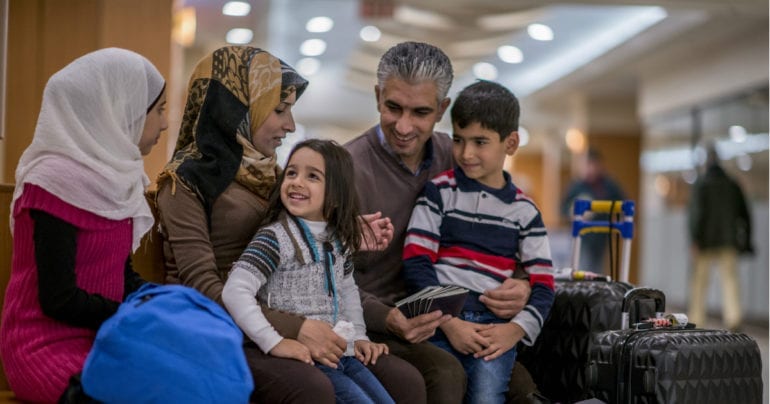For some, a career in psychology is a calling. When alumna Doha Abuzir, M.A., decided to pursue her graduate degree in clinical psychology, she had two priorities: cultural sensitivity and service.
“I’ve always wanted to help those in need, but when I dig into the ‘why,’ it becomes a bit more personal. I come from a family of refugees, my grandparents actually still reside in a refugee camp on the outskirts of Jerusalem. It’s personal, but it’s also something I try to find light in by giving back,” Abuzir says.
Knowing she wanted to one day help refugees, she was drawn to the fact that The Chicago School of Professional Psychology was founded on the principles of diversity and inclusion. After completing her bachelor’s degree, she followed her calling in international psychology with a focus on trauma and crisis.
“I always knew I wanted to be able to help refugees, but finding the right way to provide the most help became clear when I found the International Psychology (IP) master’s program at The Chicago School. Learning how to remain culturally sensitive in times of distress, is vital to understanding an individual’s ecological balance,” Abuzir says.
International psychology is based on the fact that psychology is largely affected by cultural influences. A person’s culture is made up of history, influences, relationships, and societal factors—geographically and personally. In order to understand and help someone, it’s important to take time to recognize and understand the cultural influences at play. Abuzir enrolled in the M.A. in International Psychology Online Program to explore the subject across borders literally.
“I can honestly say that I felt closer and more comfortable with my professors and peers through the online program than in the traditional on-ground program I graduated from. The connections I formed turned professors and fellow students into family,” Abuzir explains.
In addition to traditional coursework, the master’s program also requires students to go on one field experience in a foreign country to truly put theory into practice. This fieldwork opened doors for Abuzir—figuratively and literally. Already knowing she wanted to focus on helping refugees, she traveled to Sao Paulo, Brazil, for her study. “On top of learning throughout the courses, we were putting what we gathered to the test within a completely foreign country. For me, this was the ultimate preparation,” Abuzir says.
This life-changing experience cemented the fact that she was ready to work internationally. After graduation, she moved to Kuwait. Working in an international school as a school counselor, she helps her students and colleagues remember to consider the culture of the country, even when it’s not easy.
“I find myself often helping my colleagues when something occurs that is a rule of culture and is somewhat hard to understand other people and their process of life. Generally speaking, within the Western culture, age defines responsibility and authority, whereas, within the Arab culture, gender does,” Abuzir explains.
“We’ve had siblings come into our counseling center, a younger brother and an older sister, speaking about how the younger brother defines the rules for both his sister and his mother. Words relative to ‘respect’ and ‘equality’ almost seemed foreign to them, which really confused many of my colleagues who grew up in the Western world.”
With an eye on cultural sensitivity and a passion for helping refugees, Abuzir continues to live out The Chicago School’s values across the world.
Learn more about our international psychology program
Are you interested in learning more about The Chicago School’s International Psychology program? Fill out the form below to request more information, visit the program page to learn more, or you can apply today through our application portal.

